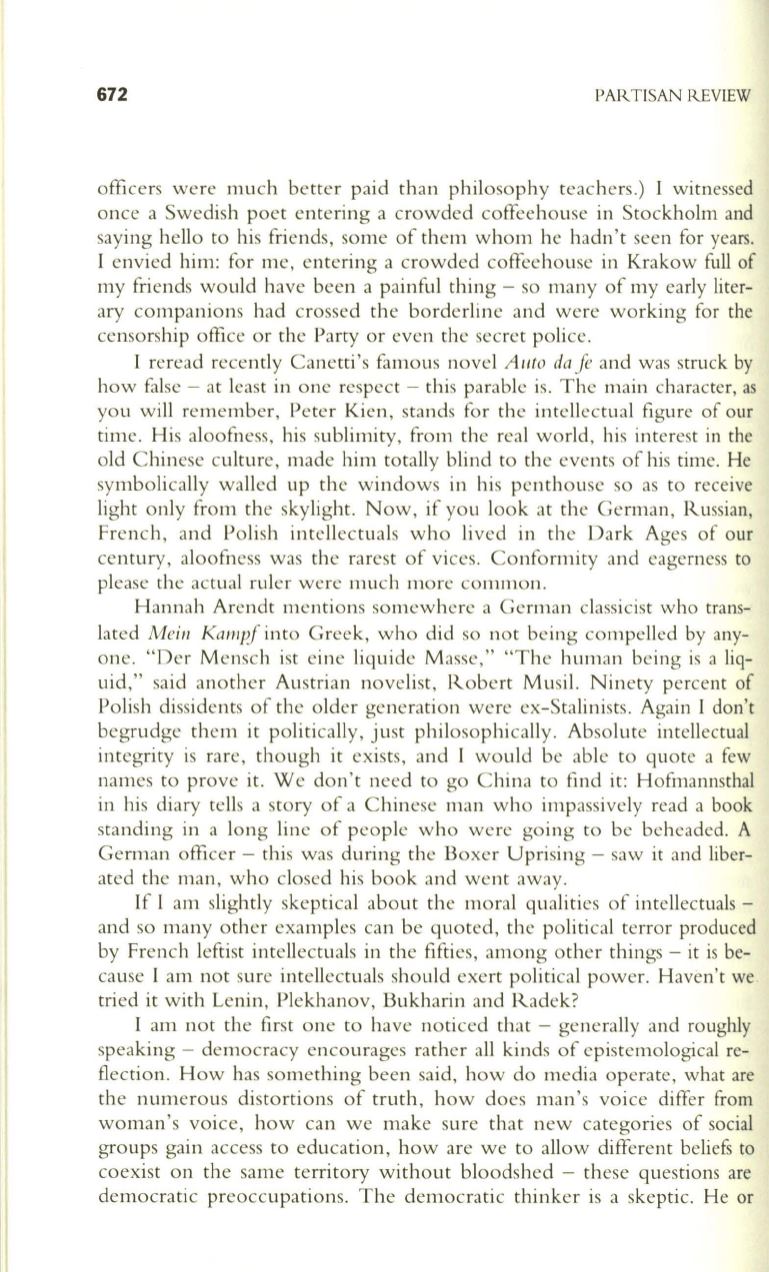
672
PARTISAN REVIEW
officers were much better paid than philosophy teachers .) I witnessed
once a Swedish poet entering a crowded coffeehouse in Stockholm and
saying hello to his friends, some of them whom he hadn't seen for years.
I envied him: for me, entering a crowded coffeehouse in Krakow full of
my friends would have been a painful thing - so many of my early liter–
ary companions had crossed the borderline and were working for the
censorship office or the Party or even the secret police.
I reread recently Canetti's famous novel
AI/to daJe
and was struck by
how false - at least in one respect - this parable is. The main character, as
you will remember, Peter Kien, stands for the intellectual figure of our
time. His aloofi1ess, his sublimity, from the real world, his interest in the
old Chinese culture, made him totally blind to the events of his time. He
symbolically walled up the windows in his penthouse so as to receive
light only from the skylight. Now, if you look at the German, Russian,
French, and Polish intellectuals who lived in the Dark Ages of our
century, aloofness was the rarest of vices. Conformity and eagerness to
please the actual ruler were much more common.
Hannah Arendt mentions somewhere a German classicist who trans–
lated
Meill
KampJ
into Greek, who did so not being compelled by any–
one. "Der Mensch ist eine liquide Masse," "The human being is a liq–
uid," said another Austrian novelist, Robert Musil. Ninety percent of
Polish dissidents of the older generation were ex-Stalinists. Again I don't
begrudge them it politically, just philosophically. Absolute intellectual
integrity is rare , though it exists, and [ would be able to quote a few
names to prove it. We don't need to go China to find it: Hofmannsthal
in his diary tells a story of a Chinese man who impassively read a book
standing in a long line of people who were going to be beheaded. A
German officer - this was during the Boxer Uprising - saw it and liber–
ated the man, who closed his book and went away.
If I am slightly skeptical about the moral qualities of intellectuals -
and so many other examples can be quoted, the political terror produced
by French leftist intellectuals in the fifties , among other things - it is be–
cause [ am not sure intellectuals should exert political power. Haven't we
tried it with Lenin, Plekhanov, Bukharin and Radek?
I am not the first one to have noticed that - generally and roughly
speaking - democracy encourages rather all kinds of epistemological re–
flection. How has something been said, how do media operate, what are
the numerous distortions of truth, how does man's voice differ from
woman's voice, how can we make sure that new categories of social
groups gain access to education, how are we to allow different beliefs to
coexist on the same territory without bloodshed - these questions are
democratic preoccupations . The democratic thinker is a skeptic. He or


